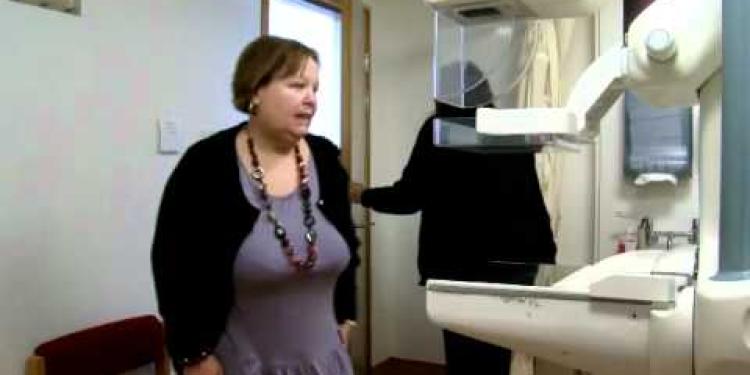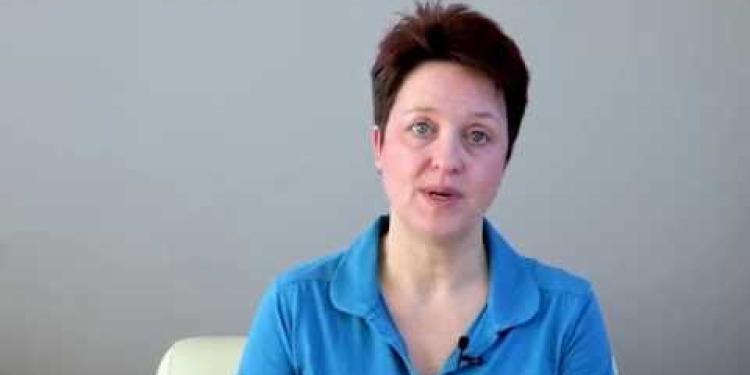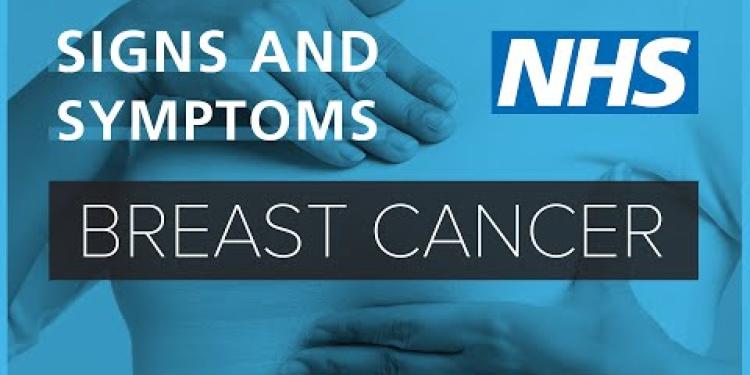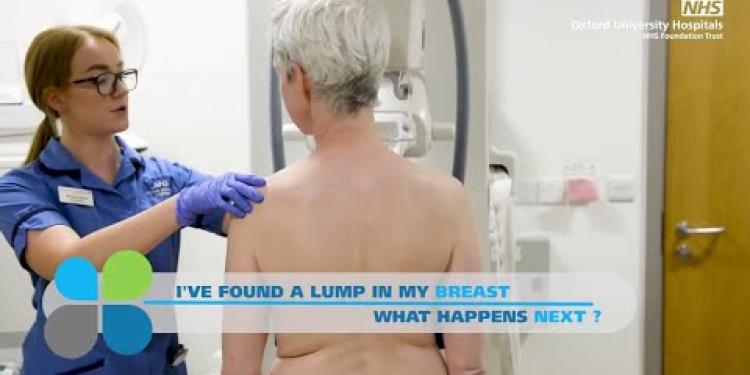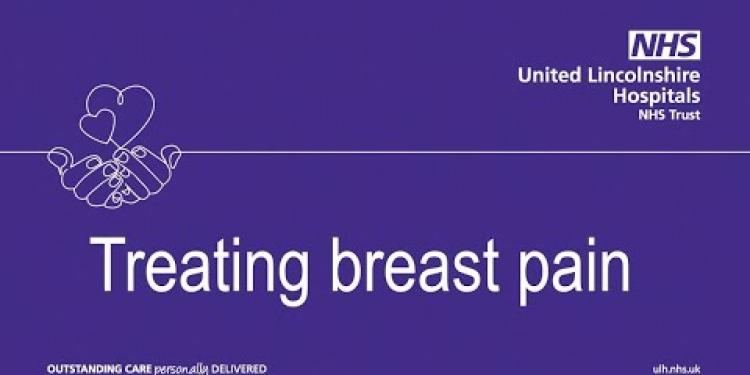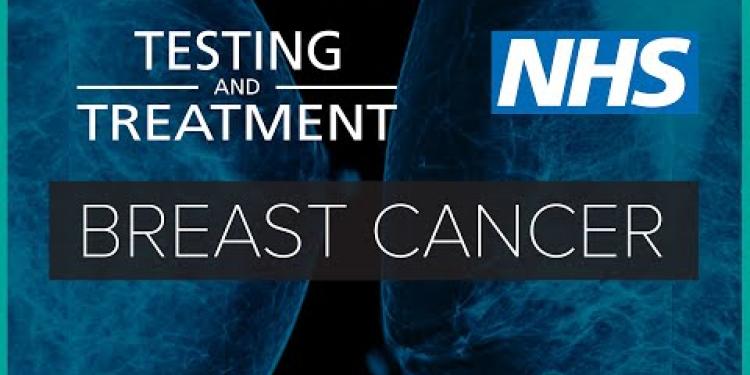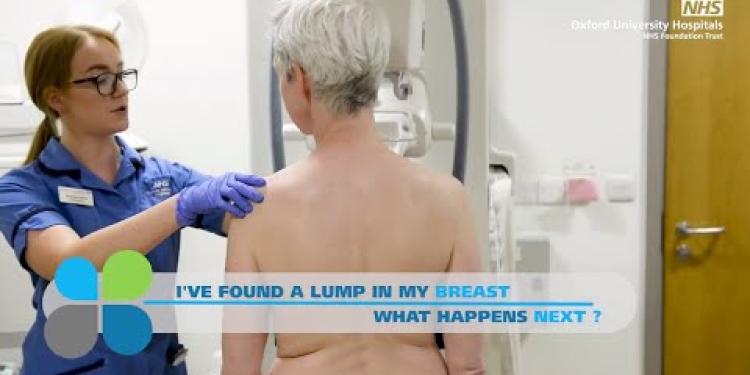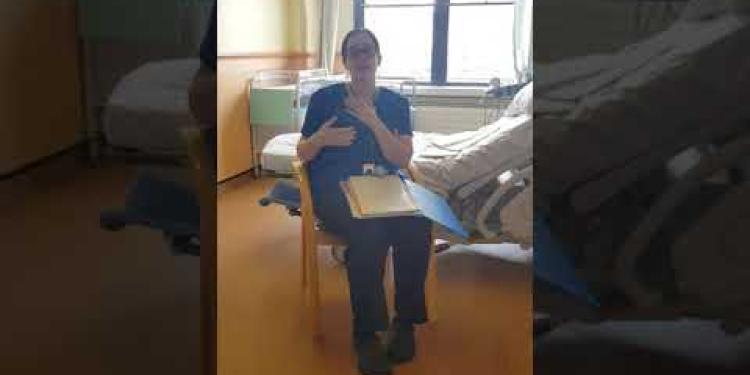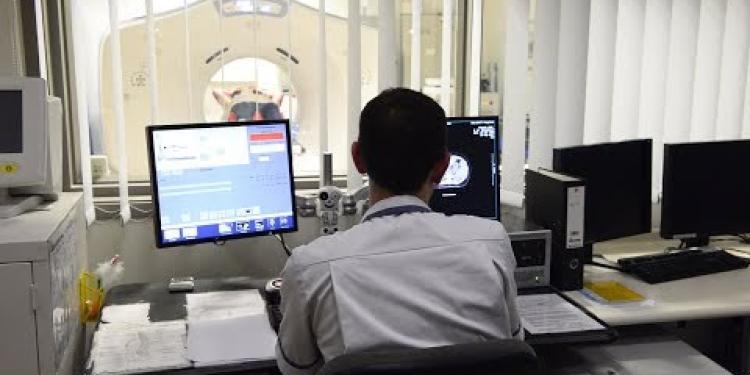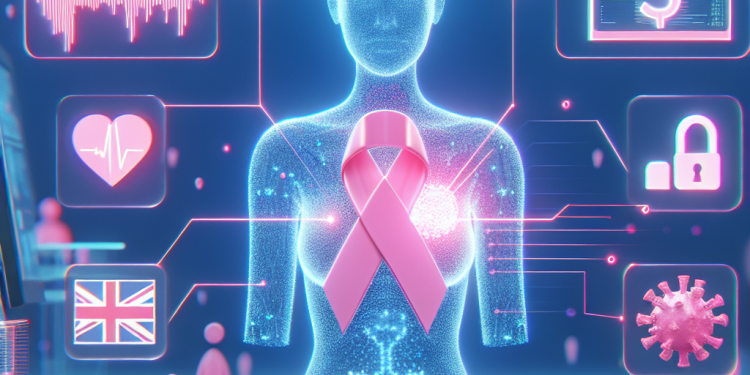Important Information On Using This Service
- Ergsy carefully checks the information in the videos we provide here.
- Videos shown by YouTube after a video has completed have NOT been reviewed by ERGSY.
- To view, click the arrow in the center of the video.
Using Subtitles and Closed Captions
- Most of the videos you find here will have subtitles and/or closed captions available.
- You may need to turn these on and choose your preferred language.
Turn Captions On or Off
- Go to the video you'd like to watch.
- If closed captions (CC) are available, settings will be visible on the bottom right of the video player.
- To turn on captions, click settings.
- To turn off captions, click settings again.
Find A Professional
Breast cancer diagnosis within the National Health Service (NHS) in the United Kingdom is a well-structured and patient-centered process aimed at early detection and effective management. Here's an overview of breast cancer diagnosis at NHS UK:
1. Clinical Assessment:
- The journey typically begins when a woman notices breast changes or abnormalities or is referred through the NHS breast screening program.
- A clinical assessment involves a thorough evaluation by healthcare professionals, including a clinical breast examination, discussion of symptoms, and review of medical history.
2. Imaging and Tests:
- Mammography: Women referred through the screening program may undergo mammography, which is a specialized X-ray to detect breast abnormalities.
- Ultrasound: Ultrasound imaging may be used alongside mammography to provide more detailed information about breast lumps or abnormalities.
- Biopsy: If suspicious findings are observed, a biopsy is often performed to confirm whether the abnormality is cancerous. The sample is sent to a pathology lab for analysis.
3. Multidisciplinary Team (MDT) Review:
- Results from clinical assessments, imaging, and biopsies are presented at a multidisciplinary team meeting, where experts from various medical fields collaborate to determine the best course of action.
4. Staging:
- If breast cancer is confirmed, further tests, such as CT scans or bone scans, may be conducted to assess the extent of cancer's spread (staging).
5. Treatment Planning:
- Once a diagnosis and cancer stage are established, the MDT discusses treatment options with the patient, which may include surgery, chemotherapy, radiation therapy, hormone therapy, targeted therapy, or a combination of these.
6. Support and Counseling:
- Patients are provided with psychological and emotional support, with access to counselors, support groups, and information resources to help them navigate their diagnosis and treatment.
7. Ongoing Monitoring:
- After treatment, patients receive regular follow-up care to monitor their progress and address any concerns. This includes routine check-ups, mammograms, and ongoing support as needed.
Breast cancer diagnosis at NHS UK is characterized by a commitment to early detection, evidence-based treatments, patient involvement, and comprehensive support services. The NHS strives to ensure that patients receive timely and personalized care, emphasizing not only medical treatment but also the emotional and psychological aspects of coping with a breast cancer diagnosis.
I've Found a Lump in My Breast - What Happens Next?
Initial Steps and Making an Appointment
Discovering a lump in your breast can be a distressing experience, but it's important to remember that not all lumps are cancerous. If you find a lump, the first step is to make an appointment with your GP (General Practitioner) as soon as possible. During your visit, your GP will perform a physical examination and ask about your medical history. If they find the lump to be suspicious, they will refer you to a Breast Diagnostic Clinic for further evaluation.The Breast Diagnostic Clinic
A Breast Diagnostic Clinic in the UK is a specialised centre equipped to assess breast abnormalities thoroughly. Once referred, you will usually receive an appointment within two weeks as part of the NHS's "Two Week Wait" referral system for suspected cancer. The clinic is staffed by a team of specialists, including radiologists, surgeons, and oncologists, who work together to diagnose and manage breast conditions.Diagnostic Tests and Procedures
At the clinic, you may undergo several tests to determine the nature of the lump. These might include:- Mammogram: An X-ray of the breast that helps identify unusual areas.
- Ultrasound: Uses sound waves to create detailed images of the breast tissue.
- Biopsy: If imaging tests show any suspicious areas, a biopsy may be performed to remove a small sample of breast tissue for further analysis.
Receiving Your Results
After the diagnostic tests, results are typically communicated within a few days to a couple of weeks. If the lump is benign, you may be advised on monitoring and follow-up. If cancer is detected, your healthcare team will discuss the type of cancer, its stage, and the best treatment options available. Treatment plans are personalised and may include surgery, radiation therapy, chemotherapy, or hormone therapy.Support and Resources
Regardless of the outcome, remember that you are not alone. Numerous support groups and resources are available for those affected by breast abnormalities and breast cancer. Organisations like Breast Cancer Now and Macmillan Cancer Support offer valuable information and emotional support for you and your family. Taking prompt action and seeking medical advice early on is crucial to ensuring the best possible outcome. Stay informed, ask questions, and don’t hesitate to seek support when you need it.The National Health Service (NHS) in the UK helps find and treat breast cancer early. Here is how it works:
1. Seeing a Doctor:
- If you notice changes in your breast or go for a regular screening, you see a doctor.
- The doctor will check your breasts, ask about your symptoms, and talk to you about your health.
2. Imaging and Tests:
- Mammography: This is a special X-ray to look for changes in the breast. It helps find any problems.
- Ultrasound: An ultrasound uses sound waves to get a better look at any lumps or changes in your breast.
- Biopsy: If the doctor sees something unusual, they may take a small sample from your breast for more testing.
3. Team Meeting:
- The test results are discussed in a meeting with different healthcare experts. They work together to decide the best plan for you.
4. Checking Cancer Stage:
- If you have cancer, the doctors might do more tests to see how much the cancer has spread.
5. Planning Treatment:
- The healthcare team talks with you about treatment. This could include surgery, medicine, or other therapies.
6. Support and Comfort:
- You can get help from counselors and support groups. This helps with understanding your diagnosis and feelings.
7. Regular Check-Ups:
- After treatment, you will have regular check-ups to make sure you are doing well.
The NHS in the UK works hard to find breast cancer early and provide good treatment and support. They make sure you get the care you need and help you with both the medical and emotional sides of dealing with breast cancer.
I've Found a Lump in My Breast - What Happens Next?
First Steps and Making an Appointment
Finding a lump in your breast can be scary, but remember, not all lumps are cancer. If you find a lump, go to see your GP (General Practitioner) quickly. Your GP will check the lump and ask about your health. If the lump needs more checking, they will send you to a Breast Diagnostic Clinic.The Breast Diagnostic Clinic
A Breast Diagnostic Clinic is a special place where experts look at breast lumps carefully. In the UK, you should get an appointment within two weeks. This is part of the NHS's fast system for checking possible cancer. The clinic has doctors who are experts in looking after breasts.Tests at the Clinic
At the clinic, you will have tests to learn more about the lump. These could include:- Mammogram: An X-ray of the breast to look for unusual areas.
- Ultrasound: A test using sound waves to see inside your breast.
- Biopsy: Taking a small piece of the lump to look at it closely.
Getting Your Results
You will get your test results in a few days or weeks. If the lump is safe, the doctors may tell you to keep an eye on it. If it is cancer, they will talk to you about what kind it is and the best ways to treat it. Treatments can include surgery, radiation, chemotherapy, or hormone therapy.Support and Resources
You are not alone. There are groups and resources to help people with breast lumps and cancer. Organisations like Breast Cancer Now and Macmillan Cancer Support are there to help you and your family with advice and support. Getting help and visiting your doctor early is important to get the best care. Keep asking questions and reach out for help if you need it.Frequently Asked Questions
What should I do if I find a lump in my breast?
If you find a lump in your breast, you should make an appointment with your GP as soon as possible. They will conduct an initial examination and may refer you to a breast diagnostic clinic for further evaluation.
What happens during a GP appointment for a breast lump?
During your GP appointment, your doctor will take your medical history and conduct a physical examination of your breasts. They may then decide to refer you to a breast diagnostic clinic for further tests.
What is a breast diagnostic clinic?
A breast diagnostic clinic is a specialised medical centre where various tests and evaluations are carried out to diagnose conditions related to the breast, including lumps.
What tests will be conducted at the breast diagnostic clinic?
At the clinic, you may undergo several tests, including mammograms, ultrasounds, and biopsies. These tests are designed to determine the nature of the lump.
How long will it take to get an appointment at the breast diagnostic clinic?
Referral times can vary, but the NHS aims to see all patients referred for suspected breast cancer within two weeks.
What should I bring to my breast diagnostic clinic appointment?
It can be helpful to bring any previous medical records related to your breasts, a list of medications you are currently taking, and questions you wish to ask your healthcare provider.
What happens if the lump is non-cancerous?
If the lump is found to be non-cancerous (benign), your healthcare provider will discuss your options, which may include monitoring the lump for any changes or removing it surgically.
Can men develop breast lumps?
Yes, men can develop breast lumps, although it is less common. Men experiencing a breast lump should also seek medical advice promptly.
Can I bring someone with me to my breast diagnostic clinic appointment?
Yes, you can bring a family member or friend with you to your appointment for support.
Will I be informed of the test results immediately?
Some initial test results, like mammograms and ultrasounds, may be discussed with you during your appointment. However, biopsy results typically take a few days to a week to be processed and returned.
Will my GP be informed of my test results?
Yes, your GP will be informed of your test results and any follow-up recommendations made by the breast diagnostic clinic.
What should I do if I feel anxious about my appointment?
It is normal to feel anxious about medical appointments. Consider talking to a family member, friend, or healthcare provider about your concerns. They can provide support and reassurance.
Can I continue to work while undergoing tests?
Most tests conducted at the breast diagnostic clinic are outpatient procedures, so you should be able to continue working. However, you may want to take the day off for your appointments to allow yourself time to rest and process any information provided.
What happens if the lump is found to be cancerous?
If the lump is found to be cancerous, a multidisciplinary team will discuss the next steps with you, which may include further imaging tests, surgery, chemotherapy, radiation, or other treatment options.
Is there a cost for treatment at the breast diagnostic clinic?
Treatment at a breast diagnostic clinic is typically provided free of charge under the NHS. However, if you opt for private healthcare, there may be costs involved.
What should I do if I find a lump in my breast?
If you feel a bump in your breast, follow these simple steps:
- Stay calm and do not worry too much.
- Tell a trusted adult, like a parent or guardian.
- Talk to a doctor to check the bump.
- The doctor can help you know what to do next.
Here are some ways to help you:
- You can use a calendar to mark a day to see the doctor.
- Ask someone to come with you to the doctor if it helps.
If you find a lump in your breast, you should see your doctor as soon as you can. They will check it and might send you to a special clinic to look at it more closely.
What happens during a doctor visit for a breast lump?
If you feel a lump in your breast, you should see a doctor. This doctor is called a GP. GP means "general practitioner" or family doctor.
When you go to see your GP, this is what usually happens:
- Listening: The doctor will listen to you. You can tell them about the lump and how you feel. Write down what you want to say before you go. This can help you remember.
- Questions: The doctor will ask you some questions. You can answer as best as you can. It’s okay to say if you don’t know or don’t understand. You can ask questions too.
- Examination: The doctor may look at and gently feel your breasts to check the lump. You may need to take off your top for this part. You can ask for someone you trust to come with you if it makes you feel better.
- Next Steps: After checking, the doctor will tell you what they think. They might say you need another test, like a scan. They will write on a paper to explain what to do next.
You can ask for help if you need it. You can bring a family member or friend. They can help remember what the doctor says.
When you visit the doctor, they will ask you about your health and check your breasts. The doctor might send you to another place that checks breasts with special tests.
What is a breast diagnostic clinic?
A breast diagnostic clinic is a place where doctors check your breasts to make sure they are healthy. If you have any lumps or changes in your breasts, doctors here can help figure out what is going on.
If you need support, you can bring a friend or family member with you. You can also ask the staff any questions you have. They are there to help you feel comfortable.
A breast diagnostic clinic is a special medical place. Here, doctors do different tests to check if there are any problems with the breast, like lumps.
What will happen at the breast clinic?
When you go to the breast clinic, doctors will do some tests to check your breasts. Here are the tests they might do:
- Mammogram: This is a special X-ray of your breast. It helps doctors see inside your breast.
- Ultrasound: This uses sound waves to make a picture of your breast. It helps doctors look at the inside of your breast.
- Biopsy: If doctors need more information, they might take a small piece of your breast tissue to look at it closely.
If you have questions, it's okay to ask the doctor or nurse. You can bring a friend or family member with you for support.
At the clinic, doctors will do some tests to check the lump. They may use X-ray pictures, sound pictures, or take a small piece of the lump to look at it closely.
How long until I can see the doctor at the breast clinic?
Here are some tips to help you understand the information:
- Ask someone you trust to read it with you.
- Use a ruler or your finger to follow the words.
- Write down any questions you have.
When a doctor thinks someone might have breast cancer, they send them to a special doctor. This is called a referral. The NHS tries to make sure everyone sees the special doctor in two weeks.
What should I take to my breast clinic appointment?
Here is a list of things to take with you:
- Any letters from the clinic
- Your health card or ID
- A list of medicines you take
- Questions you want to ask
It might help to bring a friend or family member with you. You can write down important information, or ask the doctor to do it for you.
It is good to bring any old papers from the doctor about your breasts. Also, write down all the medicines you take now and any questions you want to ask your doctor.
What if the lump is not cancer?
If the bump is not cancer (benign), the doctor will talk with you about what to do next. You might watch the bump to see if it changes, or you might have an operation to take it out.
Can men get lumps in their breasts?
Yes, men can get lumps in their breasts too. If you feel a lump, it is a good idea to talk to a doctor. Doctors can help find out why the lump is there.
Here are some helpful tips:
- Use a dictionary to understand new words.
- Ask someone to read with you if that helps.
- Draw a picture of what you read to help you remember.
Yes, men can get lumps in their breasts. It does not happen as often as it does in women. If a man finds a lump in his breast, he should go to the doctor quickly.
Can I bring someone with me to my breast clinic appointment?
Yes, you can bring someone with you to your appointment. It could be a family member or a friend. Having someone with you can make you feel better and help you understand the doctor's words.
Here are some tips to help you:
- Ask Questions: If you do not understand something, ask the doctor to explain more.
- Take Notes: Write down what the doctor says for later.
- Support from a Friend: Your friend can also ask questions and help you remember things.
You can bring someone you know, like a family member or a friend, when you go to your appointment. They can help you feel better.
Will I know my test results right away?
No, you might not know your test results right away. It can take some time to get the results. You can ask the doctor or nurse when to expect them.
If you are worried about waiting, you can try these tips:
- Ask a friend or family member to wait with you for support.
- Use a calendar to mark the date you expect to hear back.
- Practice deep breathing or listen to music to help you relax.
When you have some tests, like a picture of your breast (called a mammogram) or a special sound picture (called an ultrasound), the doctor might talk to you about these when you are there. But, if you have a tiny piece of your body tested in a special way (called a biopsy), it takes more time. You might have to wait a few days or even a week to know what those tests say.
Will my doctor know my test results?
After your test, your doctor might find out what the results are. If you have questions, you can ask the person who gave you the test. It can help to write down what you want to ask. You can also bring someone with you to help understand the information.
Yes, your doctor will know your test results. They will also know what the breast clinic suggests you do next.
What can I do if I feel worried about my appointment?
Feeling worried is okay. Here are some simple things you can try:
- Talk to someone you trust about how you feel.
- Try taking deep breaths to calm yourself.
- Make a list of questions you want to ask at the appointment.
- Bring a friend or family member for support.
- Remember, it is okay to tell the doctor you feel worried.
These steps might help make you feel better.
It is okay to feel worried about going to the doctor. You can talk to someone in your family, a friend, or your doctor about how you feel. They can help you feel better and support you.
Can I work while having tests?
If you are having tests, you might wonder if you can still go to work. Here are some things to think about:
- Talk to your doctor: It is important to ask your doctor if it is okay to work during your tests.
- Think about how you feel: If you are too tired or sick, rest at home.
- Ask for help: Tell your boss or teacher if you need support. They might give you less work to do.
You can also use easy-to-read books or listen to stories to help you understand more.
Most tests at the breast clinic are done in a way that lets you go home the same day. You can still work if you want to. But it might be a good idea to take the day off when you have an appointment. This gives you time to relax and think about what you learn from the doctor.
What happens if the lump is cancer?
If a doctor says the lump is cancer, don't worry. They will help you. They will make a plan to treat it.
Treatment can include:
- The doctor taking the lump out. This is called surgery.
- Medicine to fight cancer. This is called chemotherapy.
- Using strong rays to kill cancer. This is called radiation therapy.
Here are some ways to feel better:
- Talk to friends and family. They can support you.
- Ask the doctor any questions you have.
- Write down what the doctor tells you.
- Join a group with people who have cancer. They can share their stories.
Remember, doctors and nurses are there to help you. You are not alone in this.
If the lump is cancer, a group of experts will talk to you about what to do next. They might suggest more tests, surgery, medicine to kill cancer, special X-rays, or other treatments.
Does the breast clinic cost money?
Do you need to pay money to see the doctor at the breast clinic? If you are unsure, you can ask a nurse or a doctor to help you. They can tell you if you need to pay.
Sometimes, there might be free services. You can use tools like a calculator or ask someone for help understanding the costs.
When you visit a breast clinic, it is usually free on the NHS. But if you choose a private doctor, you might have to pay money.
Useful Links
Useful links from: About Breast cancer - signs and symptoms | NHS
- NHS - Breast cancer in women Comprehensive information on breast cancer, including symptoms, causes, diagnosis, treatment, and prevention.
- Breast Cancer Now - Symptoms and signs Detailed guide on the signs and symptoms of breast cancer provided by Breast Cancer Now, a leading UK charity.
- Cancer Research UK - Breast cancer symptoms Information from Cancer Research UK on the common symptoms of breast cancer and when to see a doctor.
- Macmillan Cancer Support - Signs and symptoms of breast cancer Supportive resource from Macmillan Cancer Support offering information on the signs and symptoms of breast cancer and how to cope with diagnosis and treatment.
Useful links from: NHS breast cancer screening
- NHS - Breast Cancer Screening Comprehensive information on breast cancer screening, including what it is, who should have it, and how to get screened.
- Breast Cancer Now - Screening Information and support from Breast Cancer Now, detailing the screening process, eligibility, and what to expect during and after the screening.
- Cancer Research UK - Breast Cancer Screening Cancer Research UK's guide to breast cancer screening, including detailed explanations of mammograms, the screening programme, and potential risks.
- Macmillan Cancer Support - Breast Cancer Screening Supportive resources from Macmillan Cancer Support that provide insights into the breast cancer screening process, preparing for appointments, and understanding results.
Useful links from: Tower Hamlets breast screening programme
- NHS Breast Screening Programme Official NHS page providing extensive information on the breast screening programme, its importance, procedures, and how to book an appointment.
- Tower Hamlets NHS Breast Screening Barts Health NHS Trust resource page dedicated to breast screening services in Tower Hamlets, including details on the local screening unit and contact information.
- Breast Cancer Now UK-based charity offering information and support on breast cancer screening, diagnosis, and what to expect from the screening process.
- Jo's Cervical Cancer Trust - Breast Screening Section Although primarily focused on cervical cancer, this UK charity provides useful information on breast screening as part of their broader women's health resources.
Useful links from: Other Things You Need to Know About Breast Screening
- NHS - Breast Screening Official NHS page providing comprehensive information on breast screening, including the process, benefits, and how to get screened.
- Breast Cancer Now - Breast Screening Breast Cancer Now's in-depth guide on breast screening, including eligibility, the screening process, and follow-up procedures.
- Breast Cancer UK - Breast Screening Information from Breast Cancer UK about reducing breast cancer risk and the importance of regular breast screening.
- Macmillan Cancer Support - Breast Cancer Screening Macmillan Cancer Support's resources for understanding breast cancer screening and its role in early detection and treatment.
Useful links from: I've found a lump in my breast - What happens next? The breast diagnostic clinic
- NHS - Breast cancer in women Provides comprehensive information on breast cancer, including symptoms, diagnosis, treatment options, and what to expect at the breast clinic.
- NHS - Breast screening Details about the NHS breast screening program, including who is eligible, how the screening is done, and what the results mean.
- Breast Cancer Now - What to expect at a breast clinic appointment Offers detailed information on what happens at a breast clinic appointment, including the types of tests and examinations that may be performed.
- Macmillan Cancer Support - Tests for breast cancer Provides an overview of the various tests that may be conducted to diagnose breast cancer, with explanations of each procedure.
Useful links from: Treating breast pain | United Lincolnshire Hospitals NHS Trust
- NHS - Breast Pain (Mastalgia) Provides detailed information on the causes, diagnosis, and treatment options for breast pain, including self-care tips and when to seek medical help.
- Breast Cancer Now - Breast Pain Offers comprehensive guidance on understanding breast pain, potential causes, and how to manage it, along with information on related breast conditions.
- Macmillan Cancer Support - Breast Pain Macmillan Cancer Support provides resources and support for those experiencing breast pain, including symptom management and advice on when to see a doctor.
- United Lincolnshire Hospitals NHS Trust - Breast Care Information on breast care services provided by the United Lincolnshire Hospitals NHS Trust, including advice on managing breast pain and accessing specialist care.
Useful links from: Breast cancer: testing and treatment | NHS
- NHS - Breast cancer NHS overview page on breast cancer, including information on symptoms, causes, diagnosis, treatment, and living with breast cancer.
- NHS - Breast cancer - Diagnosis Information from the NHS on the various tests and procedures used to diagnose breast cancer, including mammograms, ultrasounds, and biopsies.
- Breast Cancer Now - Treatment for breast cancer Comprehensive guide from Breast Cancer Now on the treatment options available for breast cancer, including surgery, chemotherapy, radiotherapy, and hormone therapy.
- Macmillan Cancer Support - Breast cancer Resourceful guide from Macmillan Cancer Support providing information on breast cancer, including symptoms, stages, diagnosis, treatments, and support options.
Useful links from: Breasts and Mastitis
- NHS - Breastfeeding and Mastitis NHS page providing information on mastitis, including symptoms, causes, diagnosis, and treatment.
- NHS - Breast Pain NHS page offering comprehensive information on breast pain, including types, causes, and when to seek medical advice.
- Breast Cancer Now - Breast Cancer and Breast Health UK charity Breast Cancer Now provides detailed information on breast cancer, breast health, and related conditions.
- La Leche League GB - Mastitis and Breastfeeding UK-based La Leche League provides support and information on breastfeeding, including managing mastitis.
Useful links from: Having radiotherapy for breast cancer - 3 Videos
- NHS - Radiotherapy for Breast Cancer An overview provided by the NHS on what to expect when having radiotherapy for breast cancer. It includes information on preparation, procedure, and potential side effects.
- Cancer Research UK - Radiotherapy for Breast Cancer Cancer Research UK provides detailed information on radiotherapy as a treatment for breast cancer, including how it works, when it's used, and what to expect during treatment.
- Macmillan Cancer Support - Radiotherapy for Breast Cancer Macmillan Cancer Support offers information about undergoing radiotherapy for breast cancer, covering the process, preparation tips, side effects, and recovery.
- Breast Cancer Now - Understanding Radiotherapy Breast Cancer Now provides resources and support for those undergoing radiotherapy for breast cancer, emphasizing understanding the treatment process and managing its effects.
Useful links from: AI Breast Cancer Screening in the UK
- NHS Breast Screening Programme This NHS page provides information about the breast cancer screening programme in the UK, explaining the screening process, eligibility, and what to expect.
- Cancer Research UK - Breast Cancer Screening Cancer Research UK's page on breast cancer screening offers insights into how breast screening works, its benefits and risks, and the role of AI in enhancing screening techniques.
- Breast Cancer Now - The Impact of AI on Breast Cancer Screening Breast Cancer Now discusses how AI technologies are contributing to improvements in breast cancer screening, with potential benefits for early detection and patient outcomes.
- The Royal Marsden NHS Foundation Trust - Technology and Innovations in Cancer Screening The Royal Marsden NHS Foundation Trust highlights the latest innovations in cancer screening technology, including the use of AI to improve diagnostic accuracy in breast cancer screening.
More Videos of Interestdiagnosis
This video also appears in these sectionsdiagnosis
Have you found an error, or do you have a link or some information you would like to share? Please let us know using the form below.
- Ergsy carfully checks the information in the videos we provide here.
- Videos shown by Youtube after a video has completed, have NOT been reviewed by ERGSY.
- To view, click the arrow in centre of video.
- Most of the videos you find here will have subtitles and/or closed captions available.
- You may need to turn these on, and choose your preferred language.
- Go to the video you'd like to watch.
- If closed captions (CC) are available, settings will be visible on the bottom right of the video player.
- To turn on Captions, click settings .
- To turn off Captions, click settings again.

